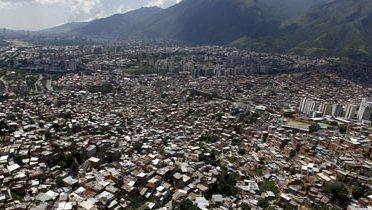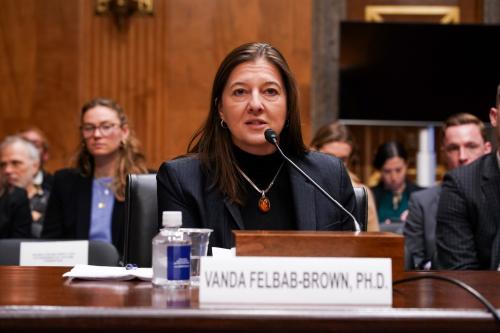EXECUTIVE SUMMARY
Public safety is increasingly determined by crime and security in urban spaces. How the public safety problem in urban spaces is dealt with in the 21st century as urbanization intensifies will determine citizens’ perceptions of the accountability and effectiveness of the state in upholding the social contract between the citizens and the state. Major cities of the world, and the provision of security and order within them, will increasingly play a major role in the 21st century distribution of global power. In many of the world’s major cities, law enforcement and social development have not caught up with the pace of urbanization, and there is a deep and growing bifurcation between developed and reasonably safe sectors of economic growth and social advancement and slums stuck in a trap of poverty, marginalization, and violence. Addressing the violence and lifting the slums from this trap will be among the major challenges for many governments.
There are many forms of urban violence. This article presents some of the key law enforcement and socioeconomic policy lessons from one type of response to urban slums controlled by non-state actors: namely, when the government resorts to physically retaking urban spaces that had been ruled by criminal or insurgent groups and where the state’s presence had been inadequate or sometimes altogether nonexistent. Its focus is on Latin America—specifically Brazil, Mexico, Colombia, and Jamaica; but its findings apply more broadly and are informed by similar dynamics between non-state actors and state policies in places like Karachi, Pakistan, and Johannesburg, South Africa.
- In response to a crime epidemic afflicting Latin America since the early 1990s, several countries in the region have resorted to using heavily-armed police or military units to physically retake territories controlled de facto by criminal or insurgent groups. After a period of resumed state control, the heavily-armed units hand law enforcement functions in the retaken territories to regular police forces, with the hope that the territories and their populations will remain under the control of the state. To a varying degree, intensity, and consistency, Brazil, Colombia, Mexico, and Jamaica have adopted such policies since 2000.
- During such operations, governments need to pursue two interrelated objectives: to better establish the state’s physical presence and to realign the allegiance of the population in those areas toward the state and away from the non-state criminal entities.
- From the perspective of law enforcement, such operations entail several critical decisions: whether or not to announce the force insertion in advance; how to generate local intelligence; and when to hand over law enforcement to regular or community police forces.
- With respect to announcing the force insertion in advance, the element of surprise and the ability to capture key leaders of the criminal organizations has to be traded off against the ability to minimize civilian casualties and force levels. The latter, however, may allow criminals to hide and escape capture. Governments thus must decide whether they merely seek to displace criminal groups to other areas or maximize their decapitation capacity.
- Intelligence flows rarely come from the population. Often, rival criminal groups are the best source of intelligence. However, cooperation between the state and such groups that goes beyond using vetted intelligence provided by the groups, such as the government’s tolerance for militias, compromises the rule-of-law integrity of the state and ultimately can eviscerate even public safety gains.
- Sustaining security after initial clearing operations is, at times, even more challenging than conducting the initial clearing operations. Although unlike the heavily-armed forces, traditional police forces, especially if designed as community police, have the capacity to develop trust by the community and ultimately to focus on crime prevention, developing such trust often takes a long time.
- To develop the community’s trust, regular police forces need to conduct frequent on-foot patrols with intensive nonthreatening interactions with the population and minimize the use of force. Moreover, sufficiently robust patrol units need to be placed in designated beats for substantial amounts of time, often at least over a year.
- Ideally, police develop not only local police forces, but community-based and problem-oriented policing as well.
- Establishing oversight mechanisms, including joint police-citizen boards, further facilitates building community trust in the police.
- After the disruption of the established criminal order, street crime often significantly rises and both the heavily-armed and community-police units often struggle to contain it. The increase in street crime alienates the population of the retaken territory from the state. Thus, developing a capacity to address street crime is critical.
- Addressing street crime, especially when through problem-oriented policing approaches, also often tends to be relatively simple and inexpensive. Moreover, preventing at least some street crime through such measures allows police forces to concentrate on more complex street and organized crime.
- Moreover, community police units tend to be vulnerable (especially initially) to efforts by displaced criminals to reoccupy the cleared territories. Ceding a cleared territory back to criminal groups is extremely costly in terms of losing any established trust of the local population and being able to resurrect it later. Rather than operating on a predetermined handover schedule, a careful assessment of the relative strength of regular police and the criminal groups following clearing operations is likely to be a better guide for timing the handover from heavy forces to regular police units.
- Cleared territories often experience not only a peace dividend, but also a peace deficit—in the rise new serious crime (in addition to street crime). Newly-valuable land and other previously- inaccessible resources can lead to land speculation and forced displacement; various other forms of new crime can also significantly rise. Community police forces often struggle to cope with such crime, especially as it is frequently linked to legal businesses outside of their area of operation. Such new crime often receives little to no attention in the design of the operations to retake territories from criminal groups. But without developing an effective response to such new crime, the public-safety gains from the clearing operations can be completely lost. Instead of countering the causes of illegal economies and violent organized crime through strengthening effective and accountable state presence, government intervention may only alter the form of criminality and displace existing problems to other areas.
- Expanding the justice system to cover areas where no courts were previously present usually takes considerable time. As a result, a dispute-resolution vacuum often emerges immediately following the clearing operations. This near-term absence of dispute resolution processes and enforcement is one impetus for the rise of crime and disorder in the post-clearing phase.
- One of the acute dilemmas encountered by law enforcement forces in the retaken territory and managers of the operation is whether or not, how quickly, and in what form to suppress illegal economies that exist in the retaken territory. There may be several reasons why the state would want to suppress the illegal economy. These include the leakage of illicit flows to other locales, a belief that the profitability of illicit profits will dissuade slum residents from switching to legal economies, and a fear that the persistence of illegal economies will pull in new violence and perpetuate anti-social and anti-state values among the slum residents.However, suppressing local illegal economies in urban spaces comes with significant costs, such as massive drops in household income of slum residents, new alienation of the population from the state, expansion of criminal activity and the rise of extortion, and the dissipation of law enforcement focus.
- Generating legal alternative livelihoods in urban spaces requires that the economic development strategy addresses all the structural drivers of illegal economic production. Beyond providing for security and the rule of law, such a comprehensive approach requires that stable property rights be established, access to microcredit developed, access to education and health care expanded, and crucial infrastructure deficiencies redressed.
- Often the most challenging problem for economic development in such situations is to generate sustainable legal jobs.
- Limited, isolated, discreet interventions, even when responsive to the wishes of the local community, are particularly ineffective in changing socioeconomic dynamics in a marginalized community. They do not have the capacity to alter basic social patterns or generate jobs in the community, and therefore, do not reduce crime. If they amount largely to patronage handouts, they can generate complex negative equilibria between criminal and official political patrons or a crime-pays type of mentality.
- Saturating an area with money in order to buy the political allegiance of the population produces neither sustainable economic development nor desirable social and political practices. Such massive cash infusions distort the local economy, undermine local administration, and can fuel corruption, new crime (such as extortion and resource theft), and moral hazard.
- Economic development of marginalized urban spaces is rarely politically neutral. While it does strengthen marginalized communities, it has the potential to undermine established powerbrokers (especially those who straddle the crime world and the official political world) by depriving them of their agent-patron role. Such powerbrokers, therefore, have an interest in hampering and limiting the extent to which the state is extended to the marginalized areas.
- Coordination across different line-ministries and agencies, and across different levels of government is often difficult to achieve, but failure to achieve good coordination can undermine the entire effort.




